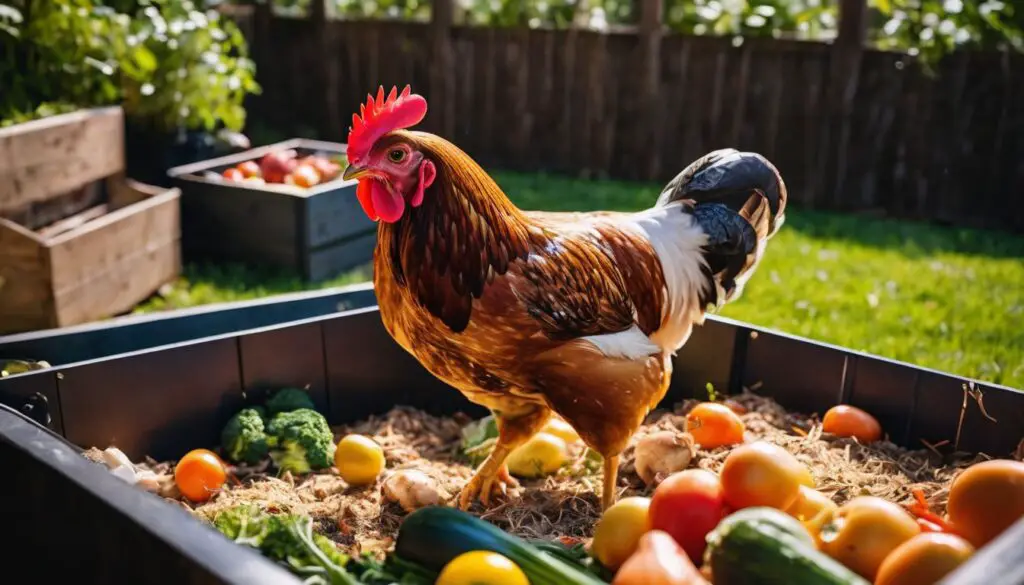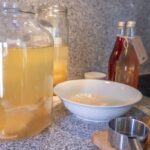Have you ever considered that your feathered friends could play a crucial role in composting? Chickens are more than just egg-layers, they’re natural composters too! Our article offers practical advice on how to effectively engage your chickens in the composting process.
Get ready to discover how these clucking wonders can turn your organic waste into nutrient-rich soil enhancer.
Key Takeaways
- Chickens can help with composting by scratching and pecking at the organic material, which helps break it down faster.
- They turn the soil and mix their manure with the compost, adding nutrients that are beneficial for plants.
- Composting with chickens is an efficient way to dispose of waste and create nutrient-rich compost for your garden.
- Properly balancing greens and browns in your compost pile is important for successful composting.
- Managing moisture levels in the compost pile ensures optimal decomposition without unpleasant odors or excess slime.
- Regularly turning the compost helps aerate it and distribute heat, promoting proper breakdown of organic materials.
How Chickens Can Help with Composting
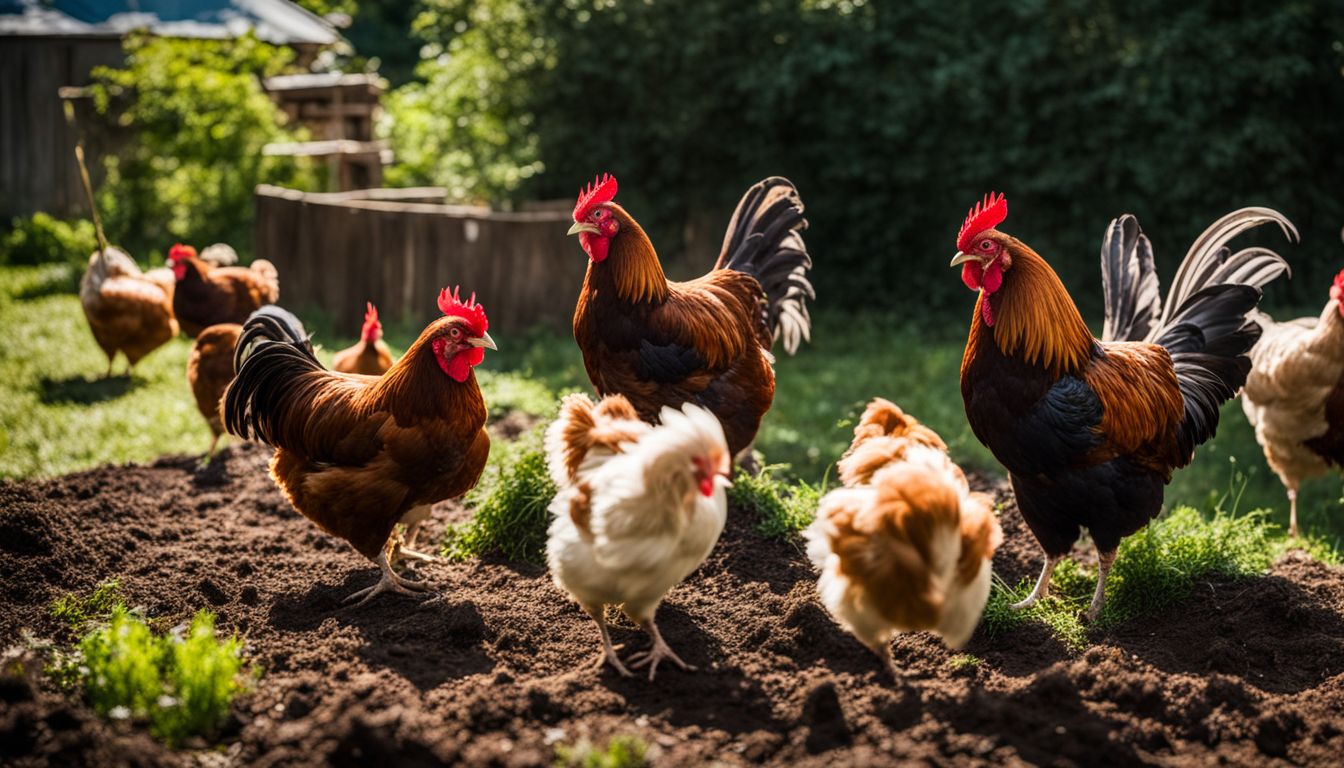
Chickens naturally scratch and peck, helping to turn the soil and break down organic matter in the compost pile.
Natural tendency to scratch and peck
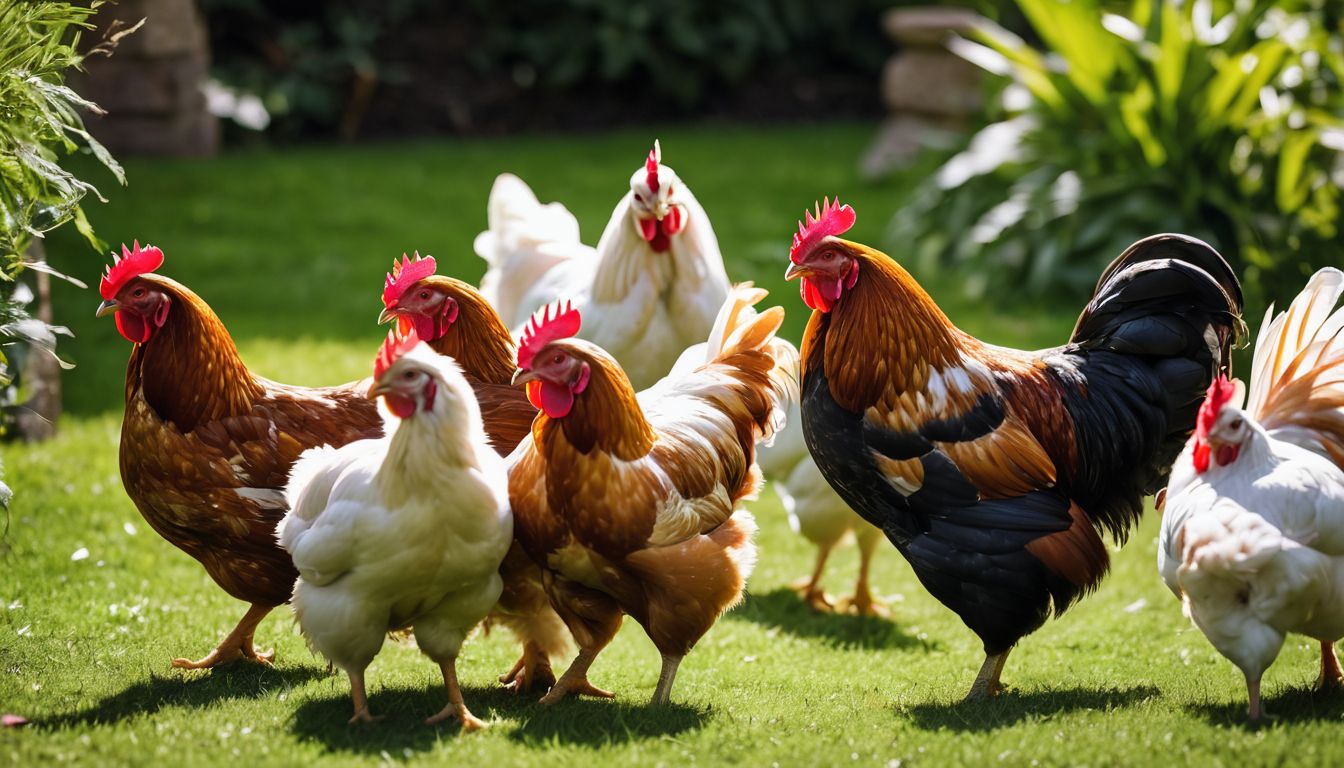
Chickens love to scratch and peck. They do this all the time. This is good for composting. Their sharp claws dig into the pile of food scraps and waste. They mix it up very well. This helps break down the stuff in the pile faster.
Also, chickens find bugs while they scratch and peck. These bugs are good protein for them to eat! So, scratching and pecking not only helps make great compost but also feeds the chickens at the same time!
Turning the soil
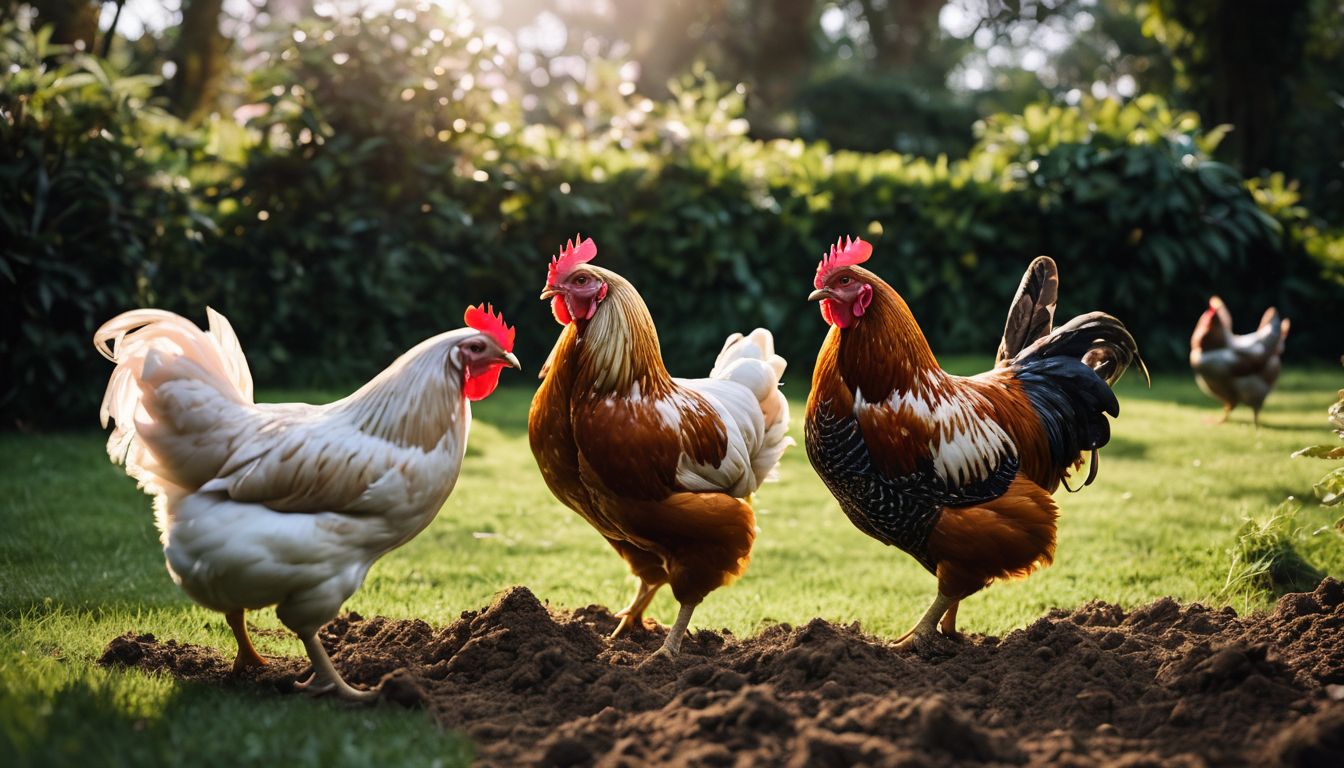
Chickens can help with composting by turning the soil. When they scratch and peck at the ground, they dig up and aerate the soil, which helps to break down organic matter more quickly.
This is important for composting because it allows for better decomposition and allows the microorganisms in the soil to do their job effectively. As chickens scratch and peck, they also mix in their manure with the organic material, adding nutrients that are beneficial for plants when the compost is used as fertilizer.
So, having chickens in your garden or chicken yard can be a great way to improve soil quality and speed up the composting process.
Additionally, when chickens turn over the soil during composting, it creates an ideal environment for insects and worms to thrive. These critters play a crucial role in breaking down organic matter even further by consuming it and releasing essential nutrients back into the soil through their waste products.
The activity of these insects and worms attracts birds like chickens who enjoy feasting on them as a protein-rich snack. In this way, not only do chickens contribute to turning over the soil but they also benefit from what thrives within it.
Breaking down organic matter
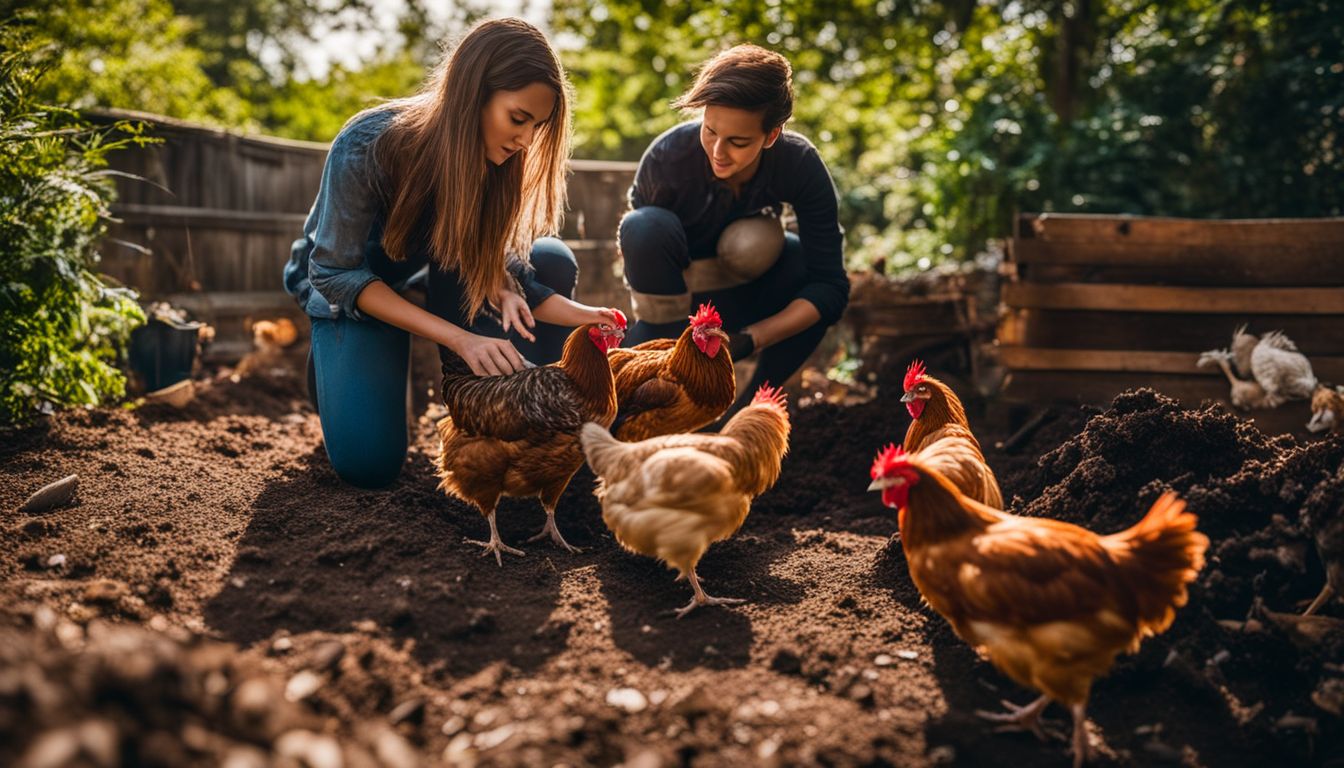
Chickens play an important role in breaking down organic matter during the composting process. When they scratch and peck at the compost pile, they help to aerate it, providing oxygen to the microorganisms that break down the waste.
Additionally, chickens attract insects and worms to the compost pile, which further aids in decomposition. Their constant movement and natural behaviors contribute to speeding up the breakdown of organic material, turning it into nutrient-rich compost that can be used in gardens or on crops.
Their presence in the composting area ensures a healthier and more efficient composting process overall.
Methods of Composting with Chickens
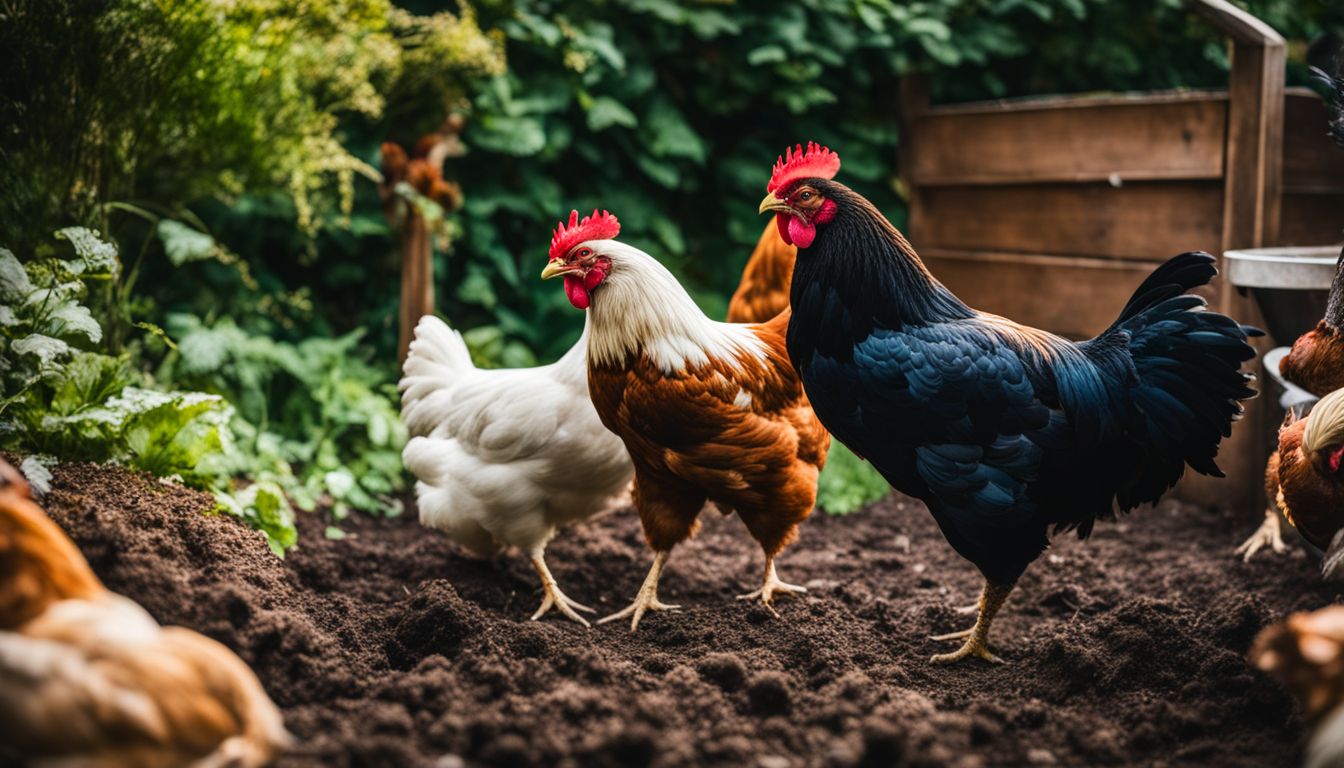
Chickens can be used in various methods of composting, including direct composting in the chicken yard, using them to turn and spread compost, and incorporating food scraps and waste.
Direct composting in the chicken yard
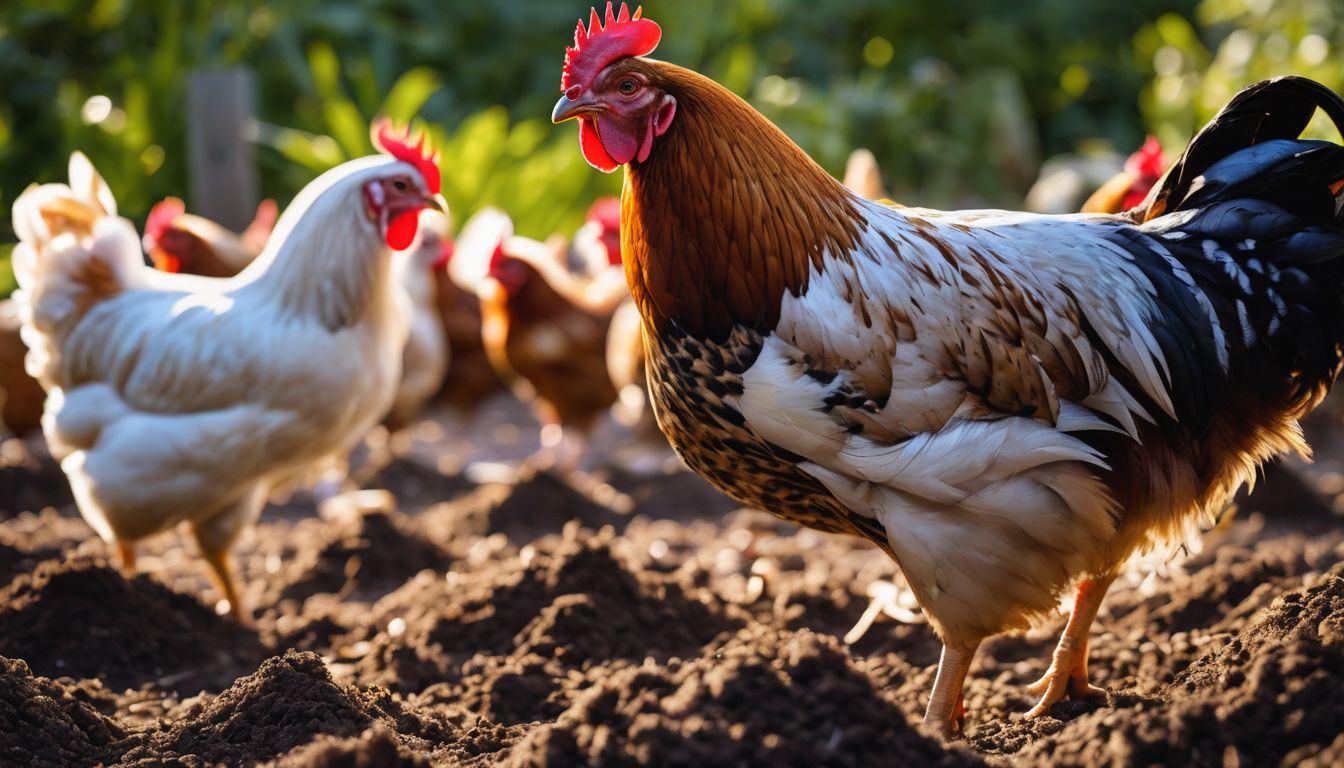
Direct composting in the chicken yard is an easy and effective method of using chickens to help with composting. In this method, you can simply add organic materials like food scraps, weeds, and chicken manure directly into the chicken yard.
The chickens will scratch and peck at these materials, breaking them down and turning them into compost. As they do this, they also provide oxygen to the microbes in the pile, helping it decompose faster.
This direct composting not only helps with waste disposal but also improves soil quality and provides nutrient-rich compost for your garden.
Using chickens to turn and spread compost
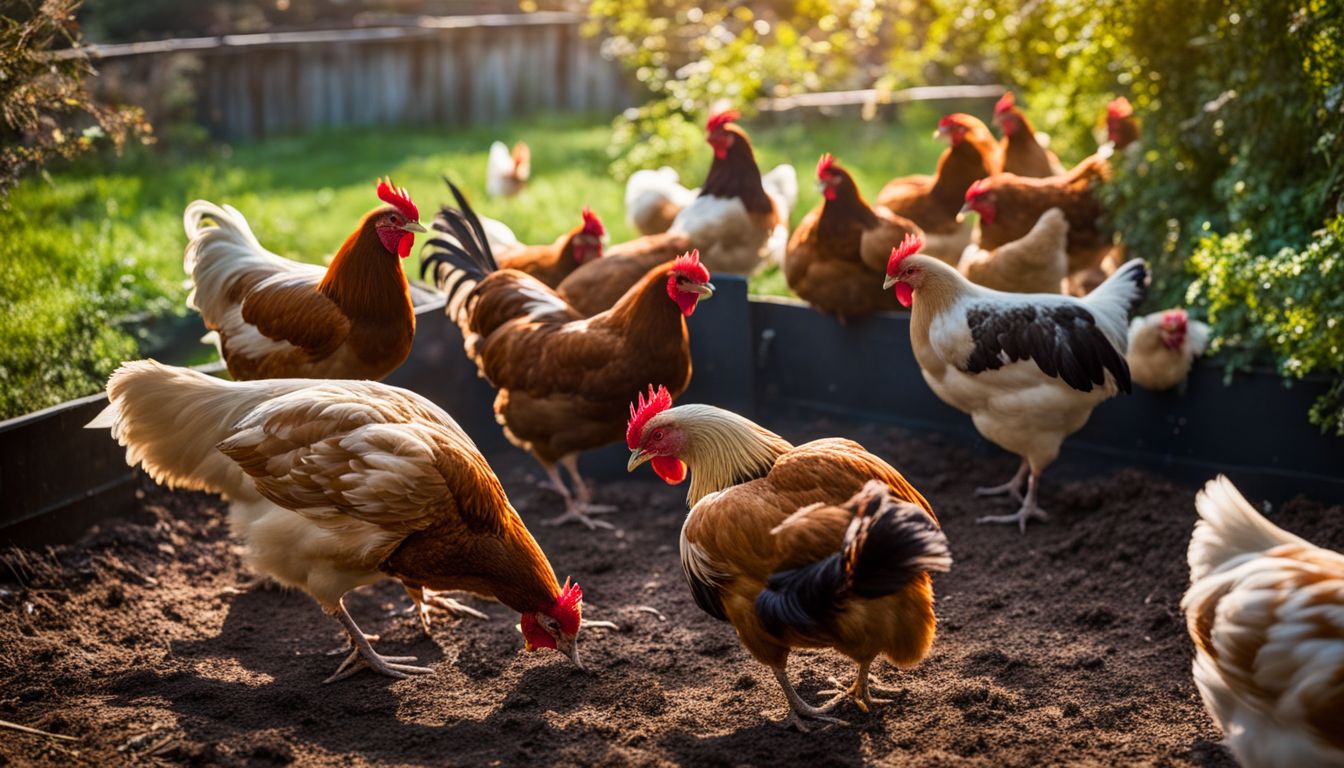
Chickens can play a helpful role in the composting process by turning and spreading the compost. As chickens naturally scratch and peck at the ground, they end up mixing the different layers of organic material, which helps to aerate the pile and speeds up decomposition.
Their scratching also helps to spread the compost evenly across the area where they are foraging. This is beneficial because it ensures that nutrients from the compost are distributed throughout your garden or chicken yard, promoting healthy soil fertility.
Additionally, as chickens scratch and move through the compost pile, they inadvertently break down larger pieces of organic matter into smaller ones, making it easier for microorganisms to do their work in breaking down materials further.
Incorporating food scraps and waste
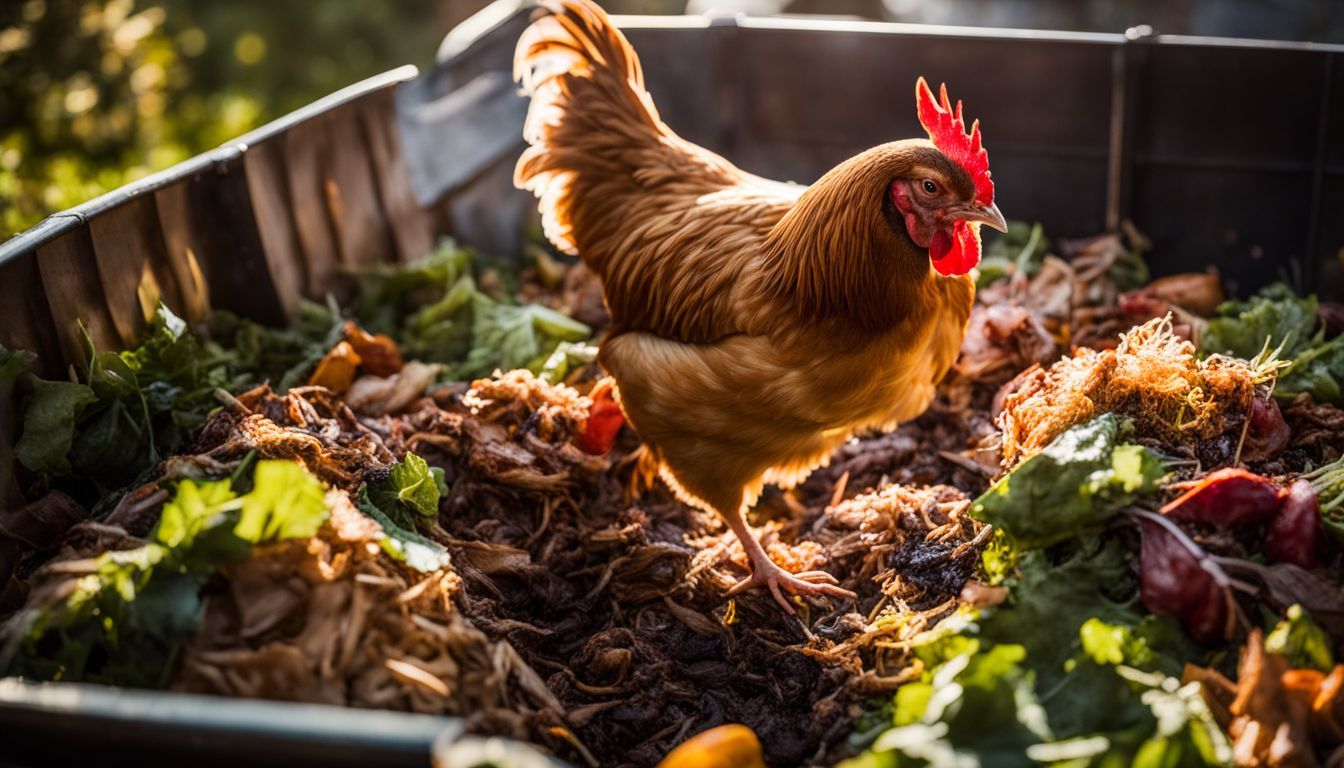 Composting with chickens is an excellent way to incorporate food scraps and waste into your compost pile. Chickens love to eat a variety of kitchen scraps, such as fruit peels, vegetable tops, and bread crusts.
Composting with chickens is an excellent way to incorporate food scraps and waste into your compost pile. Chickens love to eat a variety of kitchen scraps, such as fruit peels, vegetable tops, and bread crusts.
These leftovers provide the birds with nutritious treats while also reducing food waste in your home. As they consume these scraps, chickens naturally break them down through their digestion process.
Later, when the chickens deposit their manure in the coop or yard, it can be added directly to the compost pile along with other organic materials like grass clippings and leaves. This helps create nutrient-rich compost that can be used to fertilize your garden and promote healthy plant growth.
Benefits of Composting with Chickens
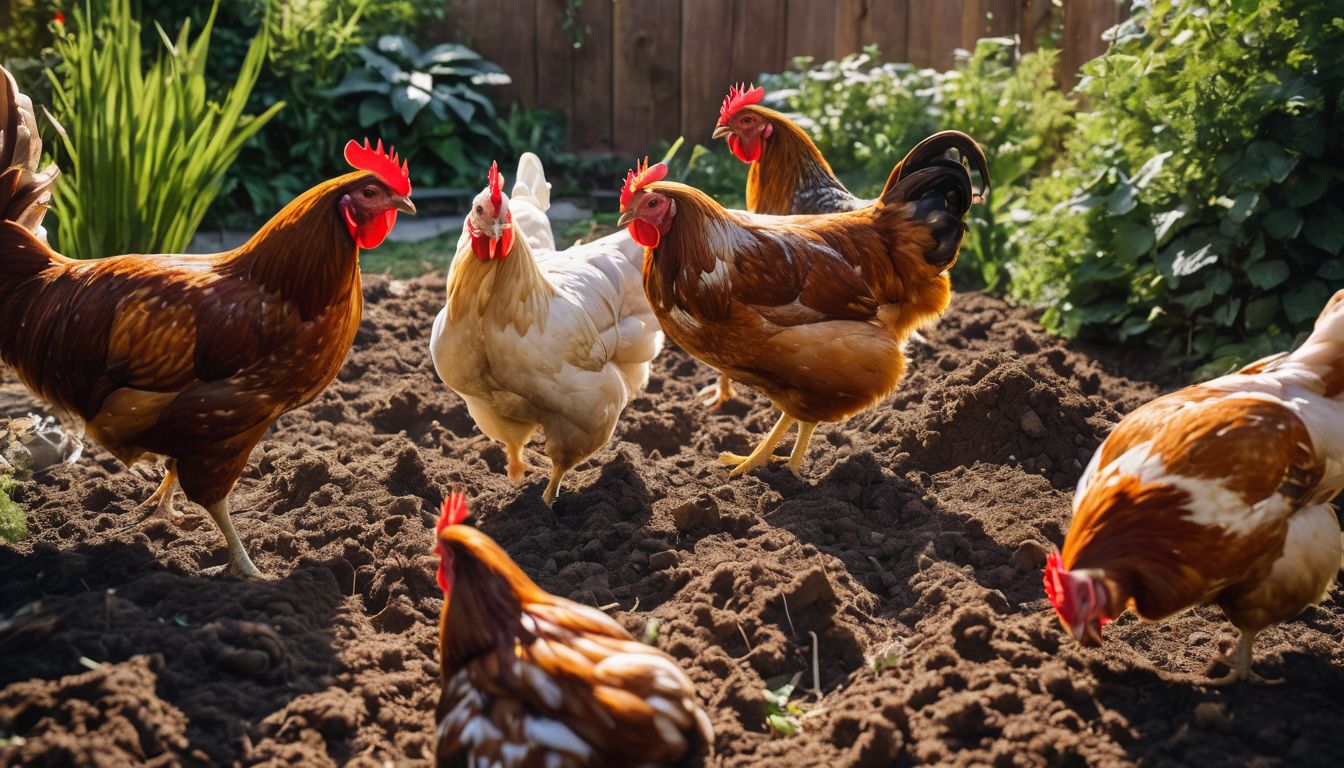
Composting with chickens provides efficient waste disposal, improved soil quality, and nutrient-rich compost. Discover how these feathered friends can transform your garden.
Efficient waste disposal
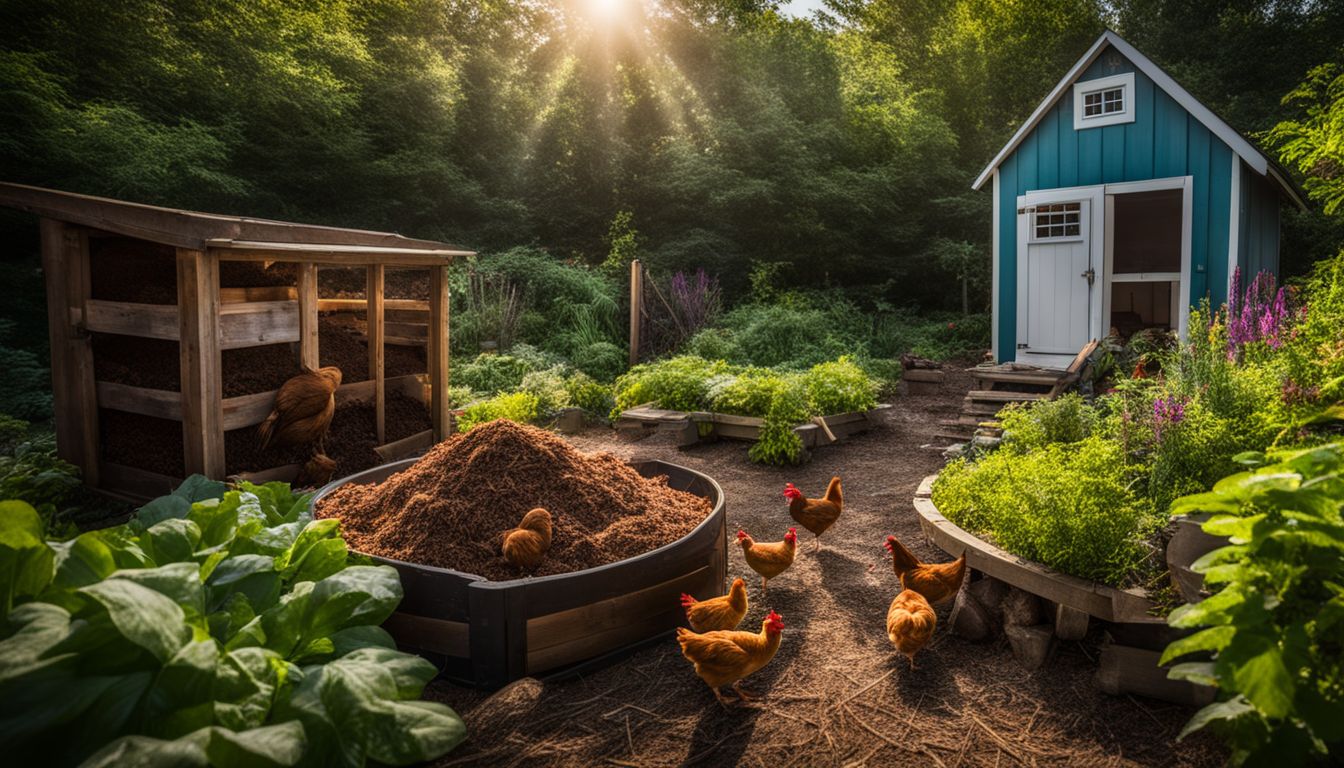
Composting with chickens is an efficient way to dispose of waste. When you add chicken manure, food scraps, and weeds to the compost pile, it breaks down quickly with the help of microorganisms.
Chicken manure contains important nutrients like nitrogen, phosphorus, and potassium that enrich the compost. Additionally, as chickens scratch and turn the soil in search of insects and worms, they help aerate the compost pile and speed up decomposition.
This means less waste going to landfills and more nutrient-rich compost for your garden or plants. Composting with chickens not only benefits your garden but also helps in managing organic waste effectively.
Improved soil quality
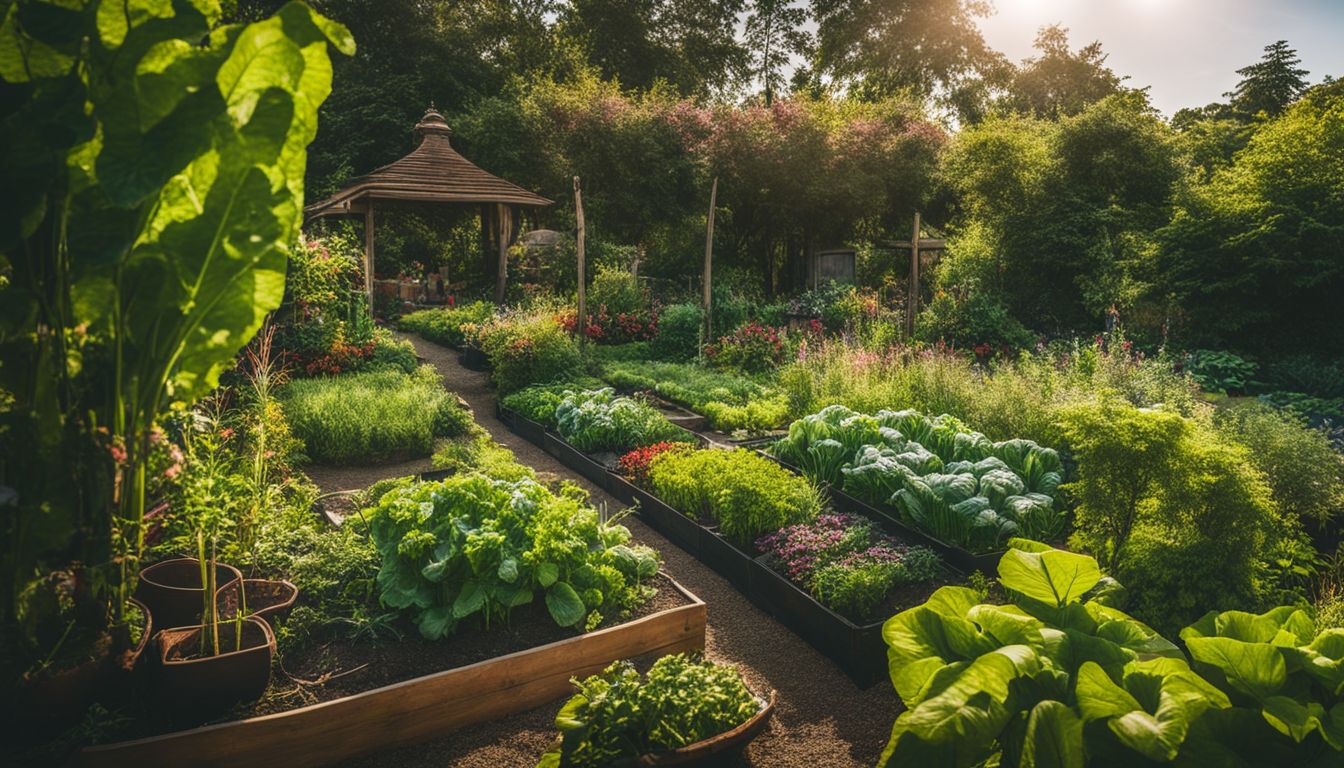
Composting with chickens can greatly improve the quality of your soil. When you incorporate chicken manure into the compost pile, it adds essential nutrients like nitrogen, phosphorus, and potassium to the soil.
These nutrients are important for healthy plant growth and development. Additionally, as chickens scratch and peck in the compost pile, they help to break down organic matter quicker by providing oxygen to the microorganisms responsible for decomposition.
This helps create nutrient-rich compost that enriches the soil and promotes better soil fertility. So if you’re looking to enhance your garden or vegetable patch, composting with chickens is a sustainable and effective way to improve your soil’s quality.
Nutrient-rich compost
Composting with chickens produces nutrient-rich compost that is great for your garden. Chicken manure contains important nutrients like nitrogen, phosphorus, and potassium, which are essential for plant growth.
When you add chicken manure to your compost pile, it helps enrich the soil and provide the necessary nutrients for healthy plants. The microorganisms in the compost break down the organic material, including chicken manure, into a form that plants can easily absorb.
This nutrient-rich compost can improve soil fertility and promote strong and vibrant vegetable growth in your garden. It’s a natural and sustainable way to nourish your plants while reducing waste at the same time.
Best Practices for Composting with Chickens
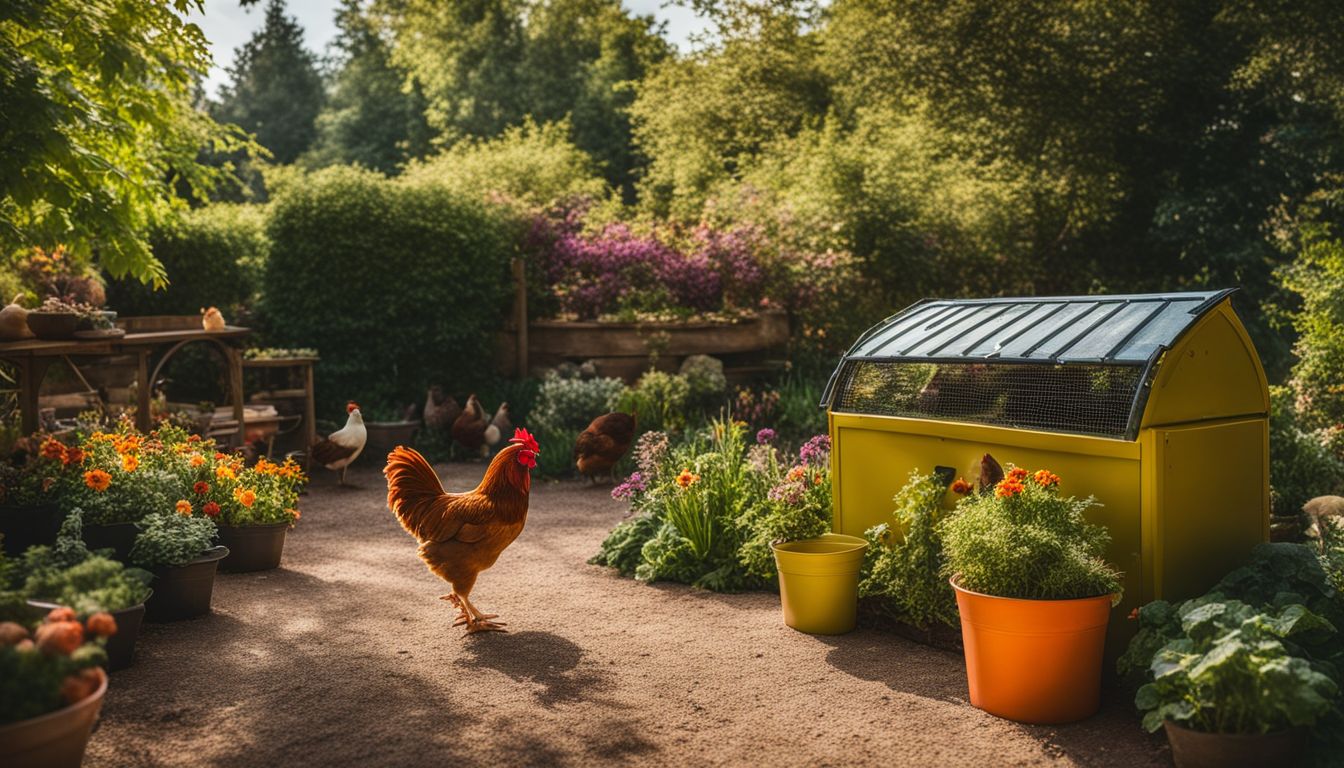
Balance the greens and browns in your compost pile to ensure a proper carbon-to-nitrogen ratio.
Balancing greens and browns
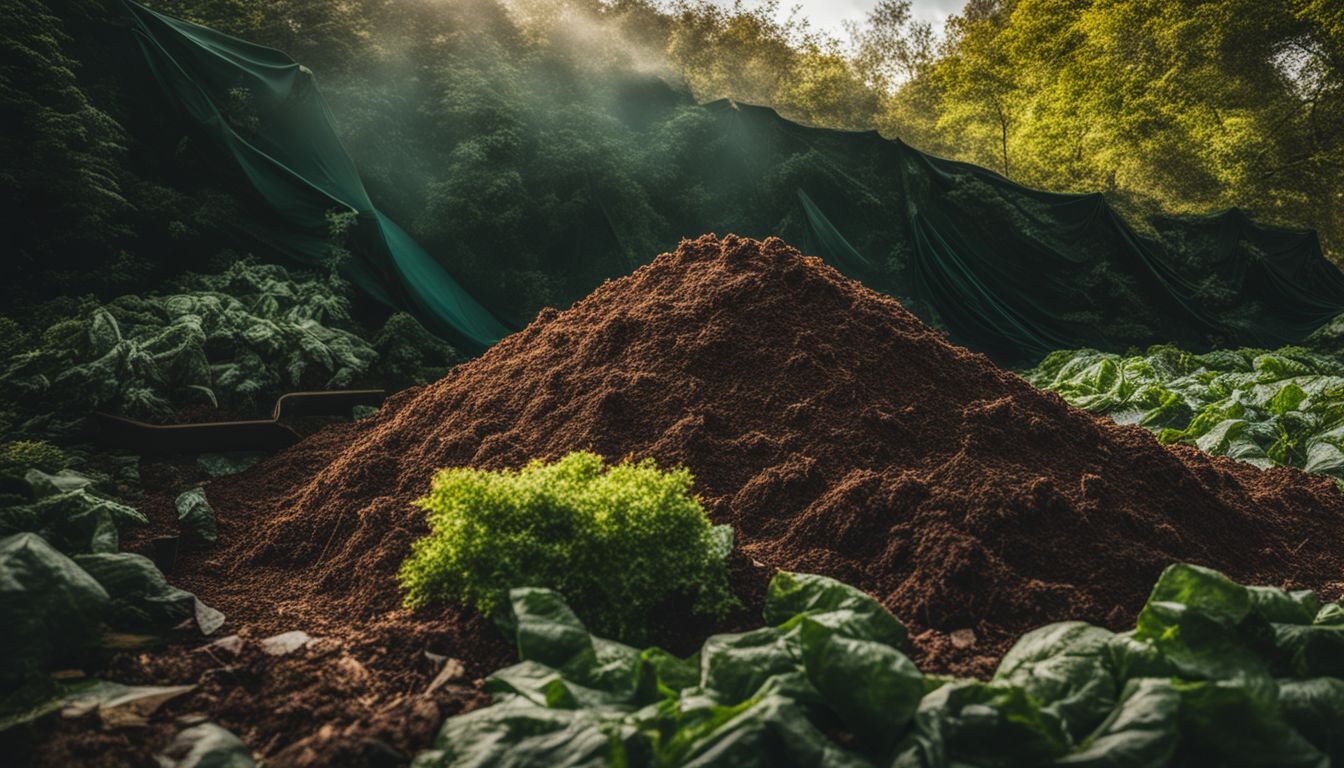 Balancing greens and browns is an important aspect of composting with chickens. Greens refer to nitrogen-rich materials like kitchen scraps, chicken manure, or grass clippings. Browns, on the other hand, are carbon-rich materials like dried leaves, straw, or wood chips.
Balancing greens and browns is an important aspect of composting with chickens. Greens refer to nitrogen-rich materials like kitchen scraps, chicken manure, or grass clippings. Browns, on the other hand, are carbon-rich materials like dried leaves, straw, or wood chips.
Achieving a balance between these two types of waste is crucial for successful composting. Too many greens can make the pile too wet and smelly, while too many browns can slow down the decomposition process.
By adding a mixture of both greens and browns to their compost pile or bin, chicken owners can create an optimal environment for microorganisms to break down organic matter efficiently.
Managing moisture levels
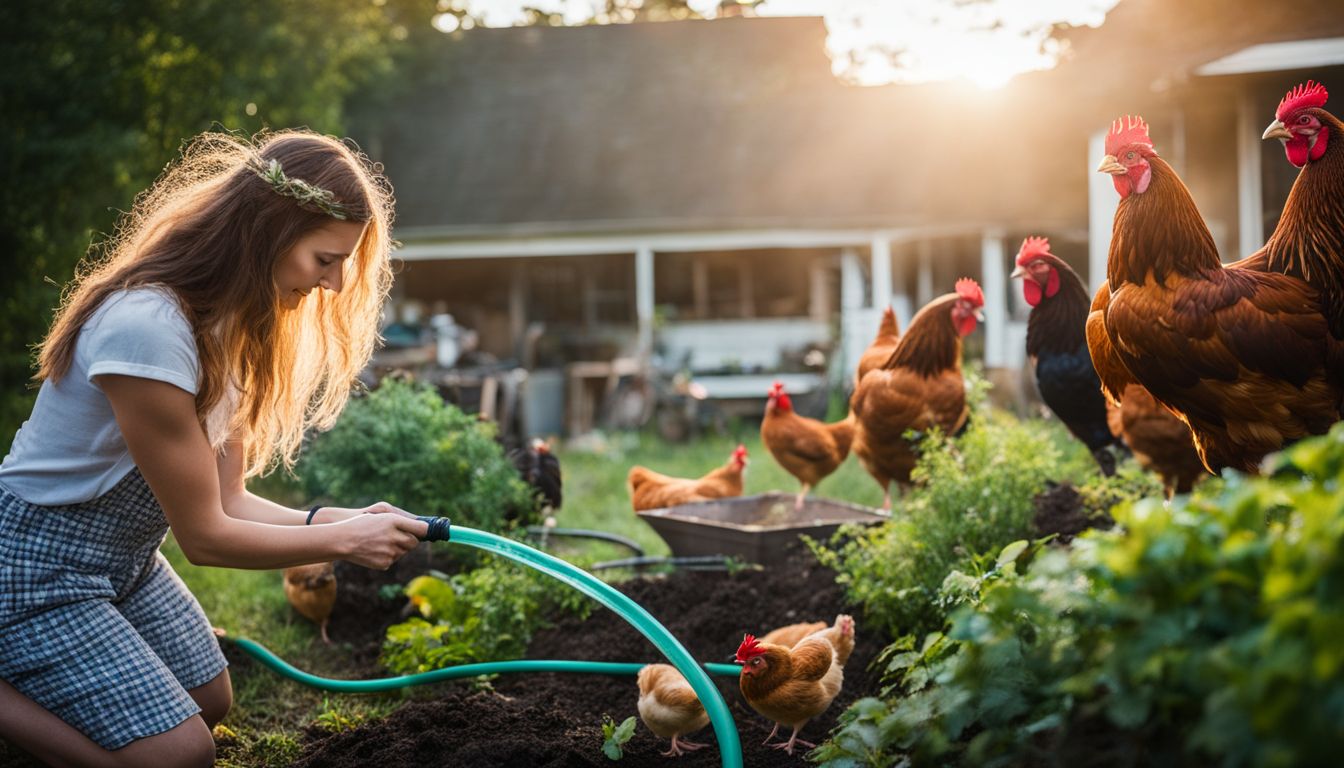
One important aspect of composting with chickens is managing moisture levels. It’s essential to keep the compost pile damp, but not too wet. Too much moisture can lead to a smelly and slimy mess, while too little can slow down the decomposition process.
To maintain the right moisture level, regularly check the compost pile and water it as needed. You can use a garden hose or sprinkle water with a watering can. Pay attention to rainfall as well, as excessive rain may require covering the pile temporarily to prevent oversaturation.
By managing moisture levels in your composting system, you’ll create an optimal environment for microorganisms to break down organic materials and produce nutrient-rich compost for your garden.
Regularly turning the compost
Regularly turning the compost is an essential step in the composting process. It helps to aerate the pile and distribute heat, ensuring that organic materials break down properly. Turning the compost also prevents bad odors from developing and promotes the growth of beneficial microorganisms.
By regularly mixing and flipping the pile, you can speed up decomposition and have nutrient-rich compost ready for your garden sooner. Don’t forget to wear gloves when turning the compost to protect yourself from any bacteria or fungi present in the pile.
Regularly rotating your compost will result in a healthier and more productive garden.
Conclusion
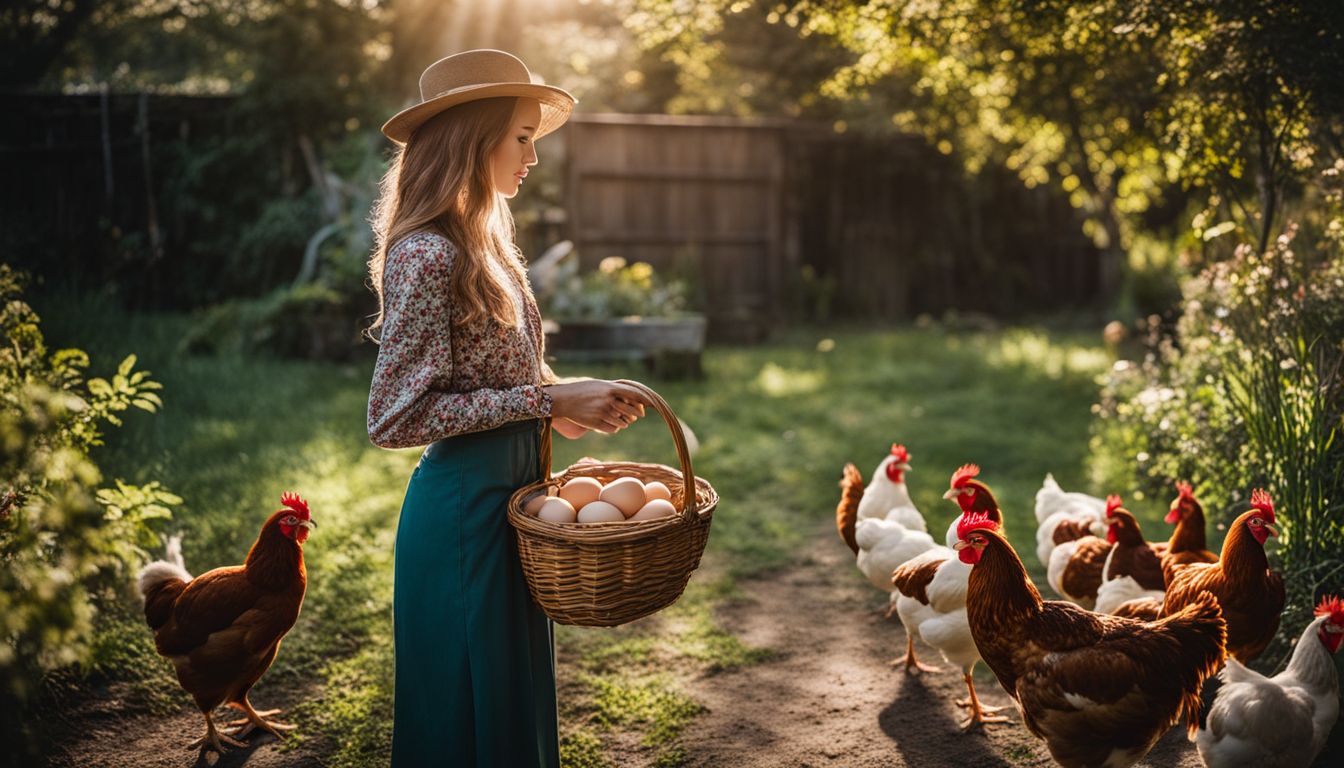
Composting with chickens is a great way to turn your organic waste into nutrient-rich compost for your garden. By utilizing their natural behaviors, such as scratching and pecking, chickens help break down the compost pile and provide oxygen to the microbes.
This not only helps with efficient waste disposal but also improves soil quality and promotes sustainable gardening practices. So, if you’re looking for an eco-friendly way to compost, consider incorporating chickens into your backyard homesteading routine.
FAQs
1. What is composting with chickens?
Composting with chickens is a form of waste management where the chicken manure, food scraps and other organic material composting happens in the chicken yard or run, also called deep litter composting.
2. How can I use my chicken coop for composting?
You can do chicken coop composting by letting your chickens turn soil and food scraps over inside their coop, which helps speed up garden composting process.
3. Can I use a compost bin when practicing this method?
Yes, having a compost bin in your chicken yard aids effective organic farming as it allows nutrient-rich worm composting to happen easily from kitchen leftovers such as vegetable peelings.
4. What are some benefits of using chickens for gardening?
In sustainable gardening practices like poultry farming, you benefit through garden-ready nutrient-rich soil provided by the chicken grass and deep litter-converted garden waste.
5. Are there any risks involved in Chicken Run Composting?
With good waste management habits such as regular turning of soil to keep the bed fresh, possible issues such as bad odor or pest infestation that could arise from poor maintenance are contained.

As a dedicated mother and passionate software developer, she weaves her diverse experiences into captivating stories that inspire and engage readers. Emma's love for sustainable living and environmental consciousness permeates both her personal and professional life. When she's not immersed in the world of coding and software development, Emma can be found nurturing her family and tending to her thriving organic garden. Her commitment to sustainable practices extends to every aspect of her life, from repurposing household items to embracing eco-friendly technologies.

